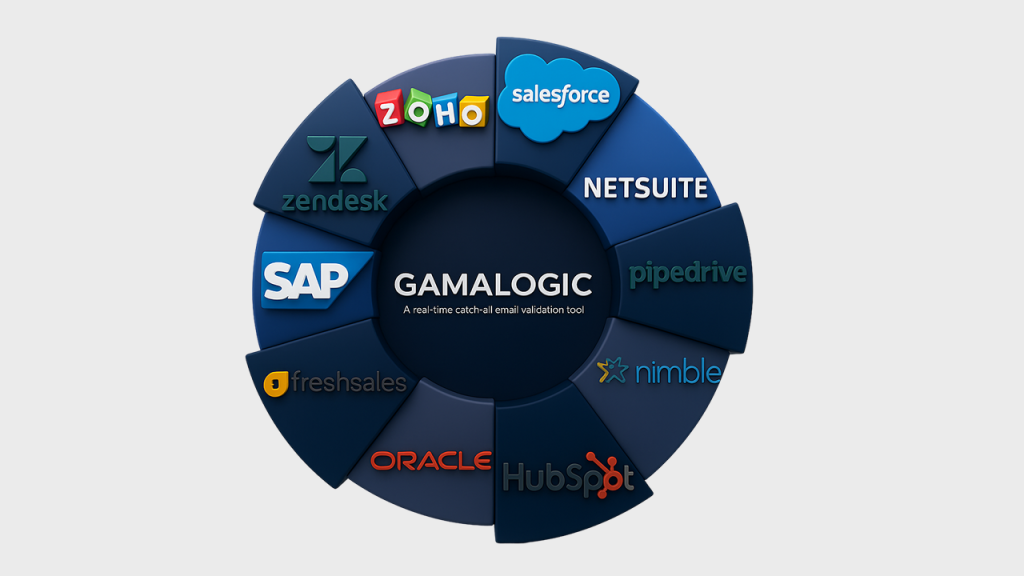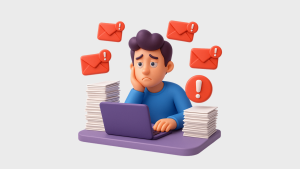- The Cost of Poor Email Data: CRM Performance and Customer Experience
- Types of Email Addresses Found in CRM Systems
- Real-Time Email Verification: Preventing Bad Data at the Source
- The Step-by-Step Process for Accurate Contact Entry in CRM
- Consequences of Ignoring CRM Email Validation
- Top Benefits of Integrating Email Verification Tools with CRM
- How Email Verification Enhances Email Deliverability and Reduces Bounce Rates
- Staying Compliant: Email Validation and Data Privacy Regulations
- How to Choose the Right Email Validation Tool for Your CRM
- The Impact of Email Reputation on Marketing and Sales Effectiveness
- Cleaning Your CRM: Identifying and Removing Invalid Email Addresses
- Best Practices for Maintaining a High-Quality Email List in CRM
- Turn Your CRM into a Growth Engine with Accurate, Validated Email Data
Within the dynamic sphere of Customer Relationship Management (CRM), the pivotal role of email validation and data quality cannot be overstated. In a landscape where every customer interaction counts, the accuracy and integrity of CRM data lay the foundation for successful business outcomes. However, maintaining pristine data is no trivial task, particularly in the face of outdated, erroneous, and unstructured information. Organizations must always heed the clarion call to safeguard their CRM treasure troves from the perils of data inaccuracies.

The Cost of Poor Email Data: CRM Performance and Customer Experience
Subpar data quality—especially inaccurate or obsolete email addresses—leads to adverse outcomes. It disrupts personalized customer communications, dilutes marketing effectiveness, and can ultimately damage relationships. Accurate data is the bedrock of personalized emails, custom offers, and client-focused solutions, fostering deeper engagement and loyalty.
Types of Email Addresses Found in CRM Systems
CRMs often contain a mix of contact email types: corporate addresses, personal consumer emails, B2B addresses, and company domains. However, when leads are imported from third-party sources, the system may also accumulate fake, fraudulent, or invalid email addresses. These problematic entries degrade data quality and must be identified and removed.
Suppose there will be an email filed in the CRM lead forms where email verification tool in real-time so there will no invalid addresses added in the database.
Real-Time Email Verification: Preventing Bad Data at the Source
A proactive approach involves real-time email verification at the point of data entry. For example, if a lead form on a website includes a verification tool, invalid addresses are rejected before they enter the system. This automated gatekeeping ensures a cleaner, more reliable CRM database.
The Step-by-Step Process for Accurate Contact Entry in CRM
Adding contact records correctly is crucial to CRM success. The process starts with collecting accurate contact information—often via surveys, web forms, or direct conversations. These inputs must be validated for accuracy and completeness. Standardization (e.g., email format, domain checks, syntax validation) is essential to ensure consistency and usability across the system.

The Hidden Dangers of Bad Email Addresses in Your CRM
Without validation, CRM systems become cluttered with useless or harmful data. Invalid email addresses result in bounced communications, lost sales opportunities, and ineffective campaigns. These inaccuracies can waste time, mislead teams, and undermine strategic efforts.
Consequences of Ignoring CRM Email Validation
Failing to validate email addresses can have wide-ranging negative effects:
- Eroded Customer Satisfaction: Outdated or incorrect emails mean customers miss important updates or offers.
- Lost Revenue Opportunities: Inaccurate data causes potential leads to fall through the cracks.
- Poor Decision-Making: Strategic decisions based on flawed data lead to missed targets and inefficiencies.
- Reputation Damage: Sending emails to the wrong contacts can harm your brand and affect deliverability rates.
Top Benefits of Integrating Email Verification Tools with CRM
To address these issues, organizations should integrate dedicated email verification tools into their CRM workflows. These tools offer several advantages:
- Data Accuracy Reinforcement: Cleans and validates emails to eliminate non-deliverables.
- Real-Time Verification: Stops bad data from entering the system.
- Enhanced Deliverability: Improves open and response rates by reaching valid recipients.
- Minimized Bounce Rates: Maintains sender reputation by reducing email bounces.
- Regulatory Compliance: Helps ensure adherence to GDPR, CAN-SPAM, and other data laws.
Bonus content: Read More: How CRM Email Validation Improves Sales Pipeline Accuracy
How Email Verification Enhances Email Deliverability and Reduces Bounce Rates
Email campaigns are only as effective as the quality of the data behind them. Email verification ensures that your messages reach real people not inactive, mistyped, or fake addresses. By reducing bounce rates and spam flags, verification helps preserve your domain’s sender reputation.
Staying Compliant: Email Validation and Data Privacy Regulations
With growing scrutiny on data privacy, email validation tools help organizations remain compliant. By removing outdated or non-consensual contacts, companies reduce the risk of violating regulations like GDPR and improve overall list hygiene.
How to Choose the Right Email Validation Tool for Your CRM
When selecting a tool, prioritize accuracy, speed, and seamless CRM integration. Look for features like syntax checks, domain verification, spam trap detection, and API support for real-time validation. Choose a tool that can scale with your CRM needs and support periodic re-validation of existing lists.
The Impact of Email Reputation on Marketing and Sales Effectiveness
Email reputation significantly impacts whether your emails reach inboxes or spam folders. A poor reputation—often caused by sending to invalid addresses—lowers deliverability, diminishes campaign ROI, and erodes brand trust. Maintaining a clean email list is vital to protecting your sender score.
Cleaning Your CRM: Identifying and Removing Invalid Email Addresses
Routine list cleaning is essential. Use tools that scan your database for invalid, dormant, or mistyped addresses. Correct common formatting issues and remove any entries that are clearly fraudulent. This helps maintain the integrity of your CRM and improves team efficiency.
Best Practices for Maintaining a High-Quality Email List in CRM
- Verify emails at the point of entry
- Use double opt-in processes
- Regularly re-validate older entries
- Remove hard bounces and inactive users
- Educate your sales team on proper data entry
Turn Your CRM into a Growth Engine with Accurate, Validated Email Data
Getting accurate emails into your CRM isn’t just a technical task—it’s a strategic advantage. With proper email validation in place, your team can engage the right people at the right time, maximize ROI, and protect your brand. Regular list hygiene and validation tools are key to turning your CRM into a true growth engine.
You might also like

How to Integrate an Email Validation API – A Developer’s Guide (Node.js / Python / cURL)
How to Integrate an Email Validation API is one of the most impactful steps you can take to ensure clean data, improved deliverability, and reduced bounces.Whether you’re a developer building a signup form, a SaaS product capturing leads. email marketer this guide will help you.

Why is Email Validation so important for Email Marketing Experts?
Invalid emails don’t just bounce—they damage your sender reputation and derail your campaigns. Learn how real-time email validation can keep your list clean, boost deliverability, and protect your brand's reach.

The Winning Email Formula: AI + Validation + Personalization = Success
Discover how combining AI, data validation, and personalization creates a powerful formula for higher engagement and conversions. In "The Winning Email Formula", we break down this strategy to help you craft smarter, more effective outreach—every time.






 No credit card required
No credit card required


Post your Comment.